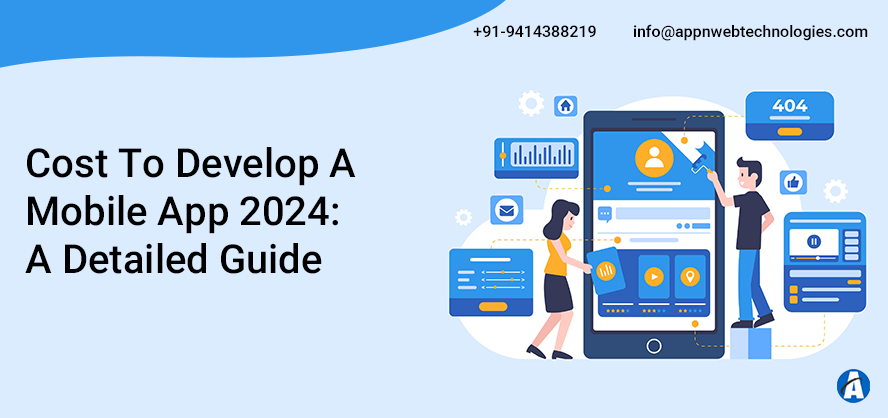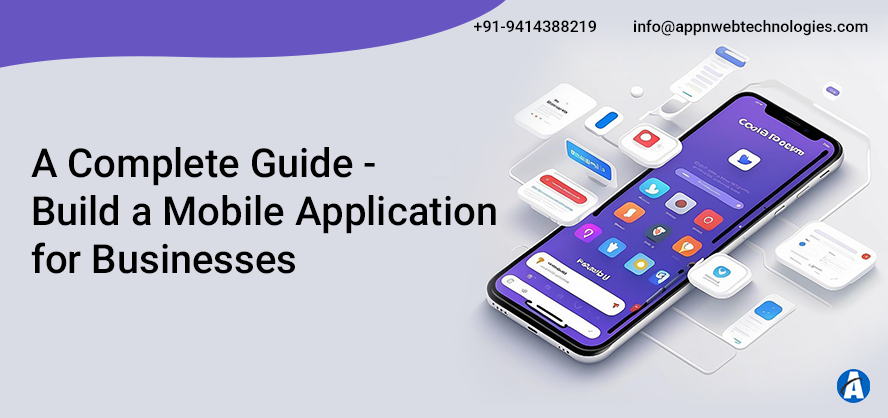Mobile App Development for Businesses – A Complete Guide

Content Writer
As of 2022, US adults spend four and a half hours on their mobile phones every single day. Thinking about what they are even doing on their phones for nearly half the work day? While texting, surfing, and checking emails are the top three mobile activities, using apps is next on the list.
Whether it’s music, social media, or games, apps are specifically tailored for mobile devices, making it easier to engage, work, and stay informed. With the convenience of reaching your loved ones and entertainment in your pocket, it drove more than 250 billion mobile app downloads last year.
It goes without saying, as people become more reliant on their mobile devices, building a well-thought-out app can compel your potential clients to interact more with your brand name. We have curated a few steps to help you develop a thoroughly designed process of mobile app development for businesses, check out the below shared complete guide for the mobile app development process.
In this guide, we will delve into every aspect of mobile app development for businesses, the benefits it offers to business owners, marketing, productivity, brand image, and the various types of mobile app development cost strategies one can choose.
What is Mobile App Development

Mobile application development is the process of creating software that runs on smartphones. Most commonly for Android and iOS operating systems, these applications can be preinstalled on the device, downloaded from a mobile app store, or accessed through a mobile web browser.
The mobile app development process will include assessing the requirements, designing, developing, launching, and financing. From retail, health, entertainment, telecommunication, and ecommerce to government app development, the market is rapidly growing. A few of the common programming languages used for this type of software development include Java, Swift, C#, and HTML5.
As a successful mobile app development company ourselves we’re sure about one thing; nowadays, mobile devices and mobile applications are the most sought-after way for businesses to connect, and stay relevant, responsive, and successful.
Benefits of Mobile App Development for Businesses
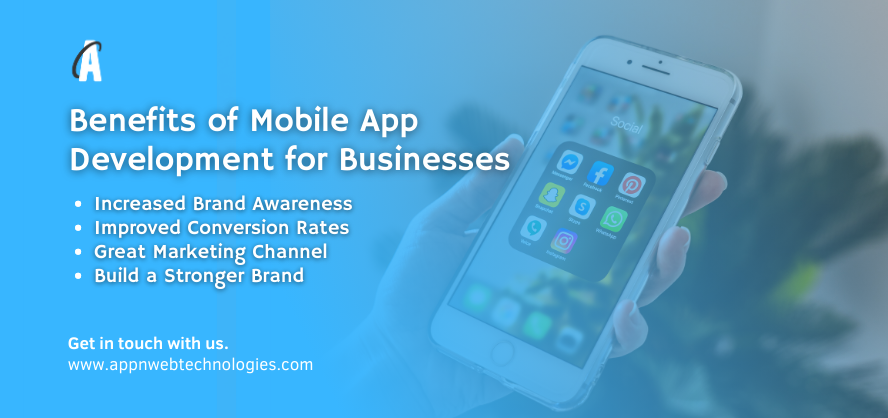
As a business leader, you’re always looking for new ways to stay ahead in the industry. Be it a startup or an established enterprise, mobile apps have become a necessity for every business. Mobile apps offer highly effective ways to build stronger client relationships. These benefits are important to you as a business owner. Below are some of the ways mobile app development can benefit your business.
Improved Conversion Rates
In contrast to many other marketing platforms, mobile applications have a significant conversion rate. Mobile applications simply make users dependable on the desired actions. In-app messaging, the app’s UI, effortless logins, notifications, secure checkout process, and social presence are all the major factors in improving conversion rates.
Increased Brand Awareness
The more significant value you provide to your customers, the more interest they will develop in your brand. However, it is possible to achieve an extensive brand experience without deliberating branding efforts. This is where mobile apps step into the scene. Mobile apps have become an innate part of our everyday lives. Your prominent presence on the app store will keep you on top of your client’s minds whenever they require your services or products.
Great Marketing Channel
In contrast to many other marketing platforms, mobile applications have a significant conversion rate. Mobile applications simply make users dependable on the desired actions. In-app messaging, the app’s UI, effortless logins, notifications, secure checkout process, and social presence are all the major factors in improving conversion rates.
Build a Stronger Brand
Another benefit of mobile app development is the marketing department. The foremost reason businesses opt for mobile apps is the direct access to user information. The data collected from the user activity can be essential in improving your marketing strategies and campaigns.
Types of App Development
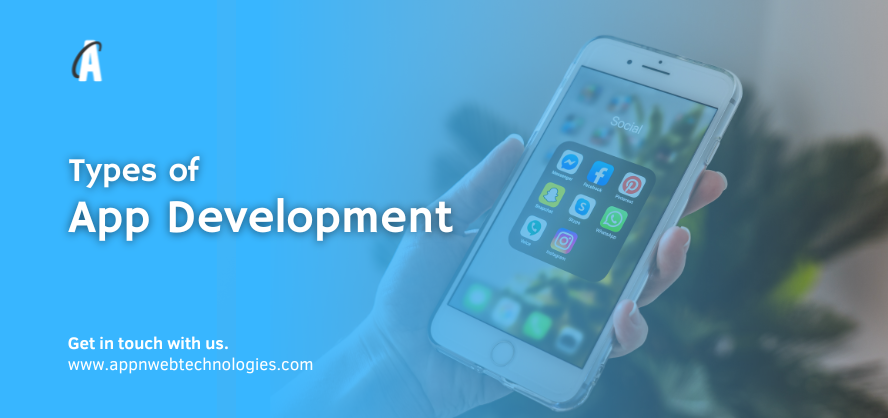
In the last few years the business landscape has changed completely, businesses rely more on technology to initiate and complete actions with consumers. Mobile apps have become an integral element of modern tech and consumers that are constantly changing to satisfy client needs. For instance, ecommerce shopping is one of the key business categories that benefit the most from mobile apps.
For instance, at APPNWEB, a mobile app development company we built a bespoke website for Pharmdel a pharmacy delivery app. It helps pharmacies to design and improve their order fulfillment and delivery service. Modern consumer behavior prioritizes convenience and mobile apps can make that possible at users’ fingertips.
Native Mobile Applications
Several independent application development companies first target to build Android apps, why? The vast majority - more than 50 percent - of people use Android-based smartphones, as simple as that. One more reason people are more fascinated with Android apps is Google Play Store has fewer restrictions as compared to Apple Play Store. In addition to Play Store guidelines, mobile app development cost is also a major factor in deciding the type of app development.
Depending on the intended use case and target audience you might have different considerations when developing a mobile app. However, before we discuss the methods and technologies for mobile app development, let’s discuss the type of app development and learn about the types of apps you can build as a developer.
Hybrid Mobile Application
Let’s say you’re targeting both the iOS and Android client niche. What will be the best software development approach? The idea of native mobile applications is to have two different apps for iOS and Android. Most enterprises of mobile app development, especially ones that require substantial API traffic, benefit from native app development.
Native apps are developed using platform-specific programming languages including Kotlin, Objective C, Swift, Python, and React Native. Native applications are high in performance and can have seamless integration with the device’s hardware and software features.
Cross-Platform App Development
Hybrid is more of a write once and runs anywhere approach. Hybrid apps use a single codebase that can run on any platform. They’re typically coded in universal programming languages including Java, Javascript, Flutter, Ionic, React Native, HTML, and CSS. Hybrid applications are great in demand in the market for their performance and efficiency.
Progressive Web Application
Simply put, cross-platform app development is about developing one app and releasing it on both iOS and Android platforms. Code reuse, low development costs, and greater audience reach are a few of the advantages of cross-platform app development.
Mobile App Development Trends 2024
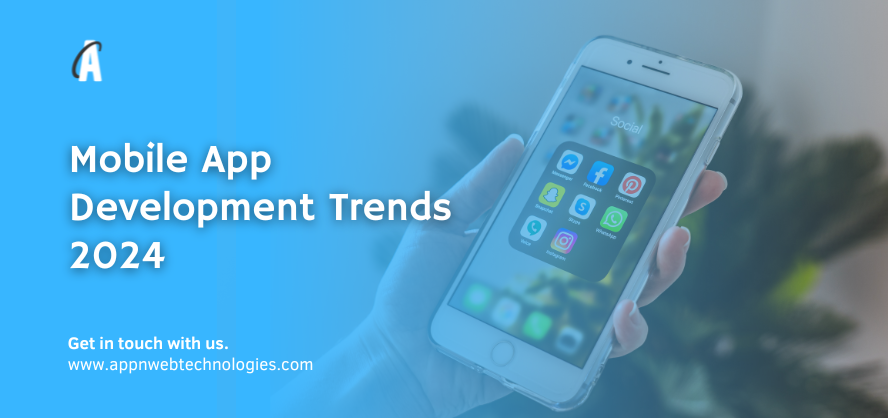
Apart from native and cross-platform app development, there’s another option left for mobile app development. Progressive web apps or PWAs are delivered through the web as opposed to being natively installed on a user’s device. Say a business wants its users to have an app-like environment without having to face the hassle of actually installing the app. The prime factor to remember is alignment with your target audience, available resources, market reach, and business goals. Programming languages used in progressive web app development are AngularJS, CSS, VueJS, JS, and HTML5.
Mobile App Development Process: Key Stages
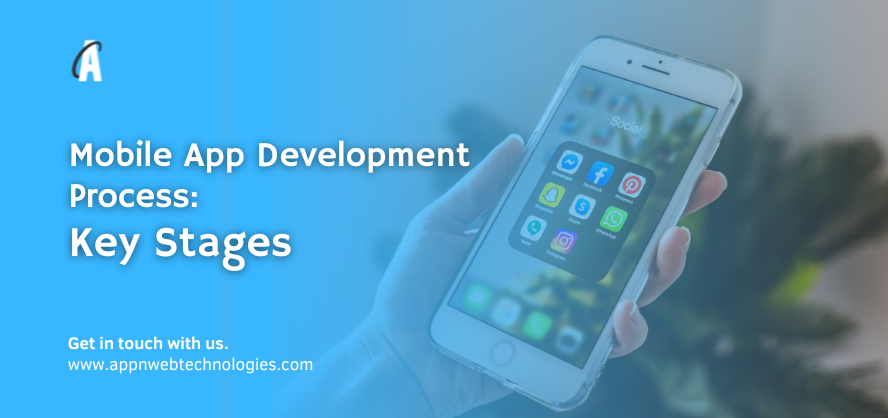
With new trends and technologies mobile app development is an ever-changing field. Staying updated is crucial for developers to become successful developers. Some of the top mobile app development trends in 2024 include cross-platform app development, the emergence of 5G networks, increasing significance of the Internet of Things (IoT). The only complication is, that you’ll need to take notice of these trends, leverage them, and track metrics to assess ROI.
- IoT Integration
- Artificial Intelligence and Machine Learning
- Voice User Interfaces
- Beacon Technology
- Rise of Foldable Device Apps
- Augmented Reality and Virtual Reality
- Chatbots and Virtual Assistants
- Cloud-based Mobile Apps
The mobile app development industry will keep expanding rapidly, and the development space will evolve. As the industry plays out, we can expect to see more innovative and exciting mobile apps in the future. Staying on top of these trends will be critical to your success.
Refine the Idea and Strategy
Developing mobile apps is generally a straightforward process. It includes design strategy, development, and deployment. If you’re looking for ways to develop an app or give your business an edge with a new application, here are certain steps you should consider in the process of app development. The process has a whole different pace which helps turn an idea into a reality.
Market Research
When starting with the mobile app development goals, you must be clear with your business needs and goals. What are you setting out to achieve? Is there a business problem you're trying to solve? Your business needs and goals will ultimately determine your entire app development process.
Decide App Features
Odds are the app market you’re trying to penetrate already has a lot of players in it. But you have the last mover advantage, which means you can research each of your competitor's pinpoints, strengths, and weaknesses. A thorough market research will help you understand how consumers react to your brands and who are the leading players in the market. This information will help you make the best app in the market.
Hire an App Development Company
It’s paramount to integrate the right feature into your app. Identify the features that are necessary to serve your users your best services. Moreover, the more features you add the higher cost it will add to your app development process.
If you’re a solution app looking for a problem to solve, you won’t be able to survive for long in the market. Make sure to figure out the challenges of your target niche and make a concerted effort to build an app that solves them.
Wireframing
Hire an app developer to ensure your app includes all the latest functionalities and necessary features at an affordable cost. An app development firm will also guide you in deciding the technology and platform you want to build your app on. A mobile app development company will generally provide you with UI/UX designers, app developers, project managers, and market specialists who will offer you valuable vision and suggestions. Technology, tools, and mobile app development frameworks are major aspects of the mobile app development process.
App Development
What’s the first you notice when you go to the App Store to download an app? It’s always the name, appearance, color combination, and the way your app looks and interacts with users. User interface and User Experience are some of the most significant aspects of mobile app development. From navigation to control buttons to end-to-end experience of users it will include everything. The app design should be
- Intuitive
- Engaging
- Fast loading
- High performance
- Easy to use
When implementing trendy mobile app design make sure it's also fast and comfortable from the user’s perspective.
For instance, at APPNWEB a web and app development company we recently developed an innovative mobile app for Jrney. It’s a free ride-sharing app. As a reputable mobile app development company we have a proven record of building engaging easy to navigate apps.
Testing
With the idea, research, features, platform, and technology in place, it’s time to start developing your app. This stage in app development will include writing codes and APIs, and testing the app to ensure it’s functioning properly. Generally, there are three aspects of any app development phase: the back end, API, and the front end.
Launch & Post-Launch Activity
Next is to test your app inside out. This will involve the testing of UI/UX, design, features, functionalities, content, performance, and overall look and feel. While this may seem simple, testing is actually a rigorous process and critical for any app development process. Testing helps developers identify the flaws and bugs that occur in the app. At APPNWEB we follow a thorough app testing process at different stages.
- Documentation Testing
- Functional Testing
- Business Functionality Testing
- Usability Testing
- UI Testing
- Security Testing
- Performance Testing
Mistakes to Avoid When Developing Mobile Applications

After the successful app testing, you can submit your app to the App Store or Play Store. However, you’ll need to comply with the store’s (App Store or Play Store) guidelines. Once your app gets approved it will be available to users to download. After successful launching the next step would be marketing and post-launch support for your app. A marketing plan will help you spread the word about your app and brand name. Marketing for your app will bolster your brand reputation and help you acquire even more users.
Not Understanding Your Target Niche
Now that we have looked into the whole process of mobile app development, it’s time to dive into the different mobile app development mistakes that come attached to the mobile app development process.
Poor UI
Discarding the needs of your target niche could thwart the successful rollout of your mobile app. First and foremost is understanding who constitutes your target audience. This will link to the market research stage of the app development process. Identifying user persona, analyzing competitors, and gathering feedback will help you gauge the requirements of your app idea.
Lack of Monetization Strategy
Unsatisfactory design can hinder the success of a mobile app. An intrinsic and user-friendly design is essential for keeping users engaged with your product and services. APPNWEB, a web and app development company, has a team of proficient designers to create an attractive and functional interface for your mobile app success.
Adding Too Many Features
When developing a mobile app, there will be costs included right from production to post-deployment. To work smoothly with these expenses and generate profit in the long run, it’s vital to decide on the right monetization strategy.
Mobile App Development Cost
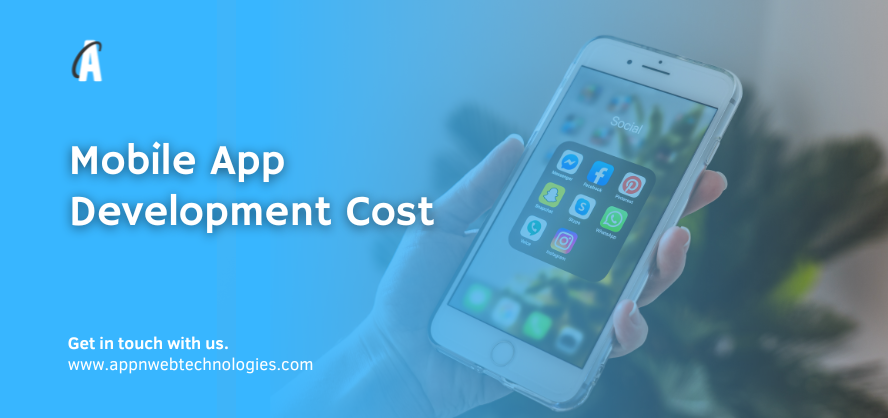
Adding too many features to a mobile app can make it cumbersome and bulky in size without adding much value to the overall user experience. In contrast, having limited features makes your app easy to understand and more useful.
FAQs

The last and most commonly asked question in the app development process is what will be the mobile app development cost. To share an overview, a mobile app development can cost from $20,000 - $300,000.
This is just a rough estimate as app development costs are variable and depend on various factors including the purpose, platform, complexity, location, time frame, and size of the app development agency. To help you through here’s an exact cost breakdown structure of how much does it cost to develop a mobile app.
There’s a lot to unpack in the process of mobile app development for businesses. At the end of the day, we’re all consumers somewhere. Take a step back, put yourself in your client’s shoes, and look at the bigger picture. Think about whether you would purchase your services and products.
What is Mobile Application Development?
How Long Does It Take To Build A Mobile App?
Mobile application development is the process of building mobile apps that run on smartphones. There are three types of mobile apps - Native, Hybrid, and Web Apps.
How to Hire a Mobile App Development Company?
On average, app development can range from three to nine months, depending on the complexity of your app and the structure of your project.
Thanks for reading!
Have a project in mind? Schedule a free consultation today.
Get StartedLet’s Dive In!
We’re a leading web and app development company with 14 Years of serving tech solutions that’ll help you maximize your business value.


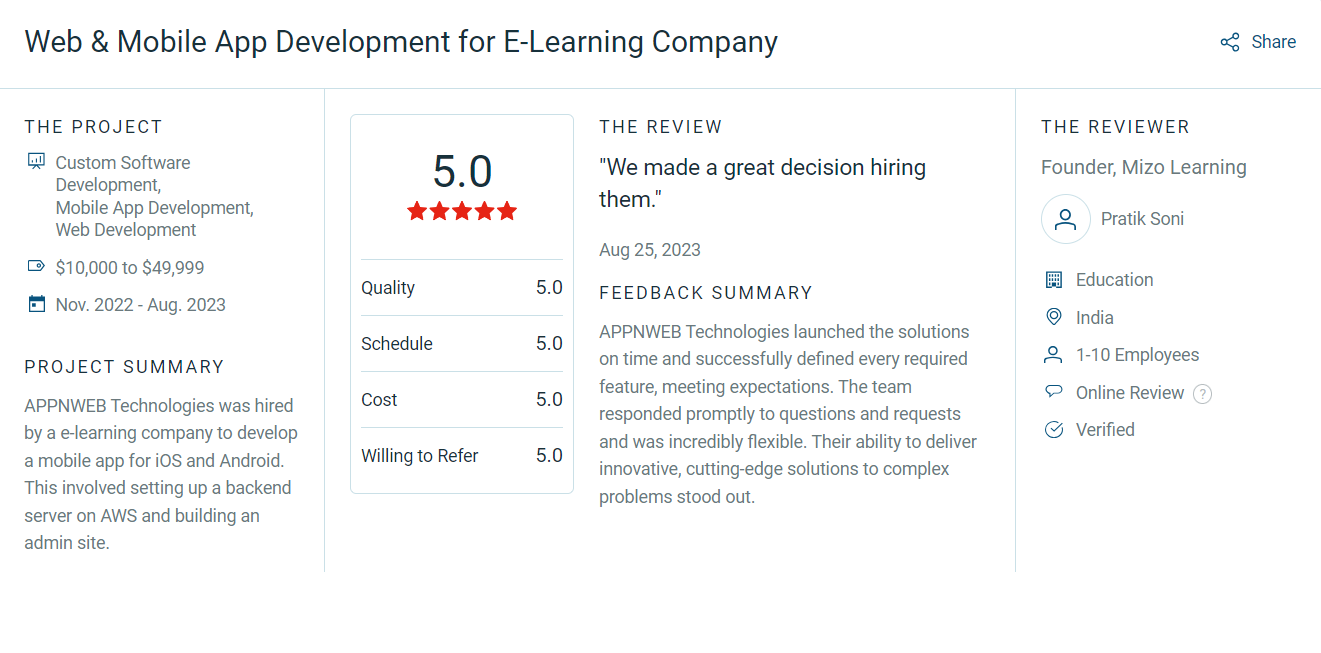












 Hire Flutter Developers
Hire Flutter Developers
 Hire Blockchain Developer
Hire Blockchain Developer
 Hire WordPress Developer
Hire WordPress Developer
 Hire Magento Developer
Hire Magento Developer
 Hire Laravel Developers
Hire Laravel Developers
 Hire SaaS Developers
Hire SaaS Developers
 Hire Shopify Developer
Hire Shopify Developer
 Hire the Best Android Developer
Hire the Best Android Developer
 Hire PHP Developer
Hire PHP Developer
 Hire the Top 3% of Java Developers
Hire the Top 3% of Java Developers
 Hire Fully Vetted Angular Developers
Hire Fully Vetted Angular Developers
 Hire ReactJS Developers in India
Hire ReactJS Developers in India
 Hire iOS Developers in India
Hire iOS Developers in India
 Hire React Native Developers
Hire React Native Developers
 Hire Python Developers
Hire Python Developers


